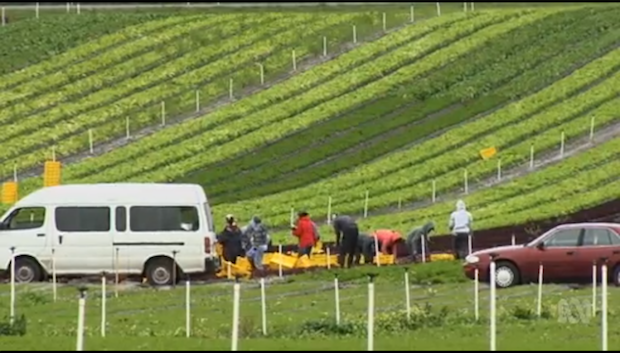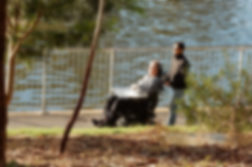The footage was disturbing. Young migrant workers, many of them on 417 visas supposedly meant for backpackers on “working holidays”, in conditions of bonded labour not much different from share-croppers of the American south.
The revelations of “extreme exploitation of migrant labour, sometimes on false documents” that aired last night on the ABC’s Four Corners should certainly concern us. Australia has long prided itself on high living standards and a minimum wage that ensures ordinary workers can meet the necessities of life.
Australia’s legislated minimum wage for instance, is one of the highest in the world: $640.90 per week before tax, calculated on the basis of a week of 38 ordinary hours, or $16.87 per hour.
Our minimum wage system dates all the way back to 1907 and the famous Harvester judgment of Justice Henry Higgins, when a court ruled on a living wage for an “average employee regarded as a human being living in a civilised community.”
The majority of Australian employees – around 63 per cent – are full-time, protected by an award or employment contract, and enjoy a series of entitlements like annual leave, parental leave, public holidays and four weeks’ notice on termination.
But despite the long history of legislative protections for workers, in recent decades a lively underground in labour exploitation has sprung up in this country – intended to circumvent the adequate wages and conditions that Australian law demands.
Struggling far below the majority of full-time salaried workers, Australia now harbours a growing underclass of precarious, casualised and often exploited labour.
At its most extreme end, this underclass encompasses the quasi-slave labour exposed by the ABC’s Caro Meldrum-Hanna last night. But it is far more widespread than even last night’s episode makes clear.

Casualised and insecure labour now makes up nearly a third of Australia’s workforce. According to the Australian Bureau of Statistics, in 2013 there were 2.25 million workers “without paid leave” – in other words, casuals – working in this country. You can add an extra 986,000 independent contractors, many of whom are in effect employees of their main client, but without any of the normal entitlements of employment, including superannuation.
And then there are those working without any protections at all – the army of cash workers in our cafes and restaurants, building sites and offices, many of whom are taking home $15 or $12 or even $10 an hour, cash in hand, no questions asked, and no entitlements extended.
Try it yourself: ask your favourite barista if they are paid in cash. You may be surprised at the answer. Many cafes and restaurants flout employment law, paying their often young and itinerant workforce “off the books” while maintaining a semblance of propriety with doctored ledgers and dubious accounting procedures.
A survey back in 2012 by the Victorian Trades Hall found that a quarter of workers aged 18-30 had worked off the books or for cash.
Not that we should single out the hospitality industry. Those who think labour exploitation is confined to an unlucky fringe of backpacking baristas or migrant workers on distant farms would be shocked at the employment practices of Australia’s 39 public universities. I spoke to a friend in Brisbane last night, whose partner has taught casually at a Brisbane university for several years. The university has unexpectedly decided not to offer the subject this semester. Suddenly, there is no work.
Nearly half of all the academics in our publicly-funded university system are casuals. The practice is so widespread, it’s becoming increasingly rare for an undergraduate student to encounter a full-time academic. Those casual tutors and lecturers are paid only for the hours they teach and mark, with a minimum of preparation.
There is no pay during university holidays, and no security from semester to semester. That can mean no pay from November to March, when semester starts up again.
As a result, many sessionals are juggling two, three or even four different casual gigs, often spread across multiple campuses and universities. Despite the supposedly generous pay rates on offer, National Tertiary Education Union statistics show that many tutors are struggling to make ends meet. In 2012, an overwhelming 82 per cent of casual academics said they were undertaking unpaid work such as marking and answering student enquiries as part of their casual employment.
This sort of insecurity is faced by millions of Australians from week to week. In 2012, the ACTU conducted an extensive inquiry and report into insecure labour. The findings weren’t pretty.
It found that while insecure labour was worst in the hospitality and agriculture sectors, “nearly all industries have seen a strong growth in casual density over the past few decades.” As Monash University’s Veronica Sheen wrote back in 2012, “employment insecurity now pervades many workplaces and industry sectors especially in the service sector but also in areas such as manufacturing and warehousing.”
Increasingly, the dirty business of exploiting workers is being undertaken by labour hire firms, like the ones highlighted last night on Four Corners. These businesses act as handy fig-leafs for employers, who sub-contract their workforces out to these operators, allowing them to pretend they not responsible for their workers’ pay and conditions.
The labour hire industry has been growing for decades. As long ago as 2005, the Productivity Commission was concerned enough about the industry to issue a report, which found that that the sector had grown by 157 per cent between 1990 and 2002.
Since then, labour hire arrangements have continued to grow. By 2011, the ABS estimated that 605,000 Australians obtained their job through labour hire arrangements – almost certainly an underestimate, given that undocumented and illegal workers are not likely to be picked by ABS surveys.
Last night’s Four Corners report was just the tip of the iceberg. Poor pay and unacceptable conditions are rampant in many parts of Australian industry. The most shocking thing about worker exploitation in this country might be the fact that we are shocked at all.
Donate To New Matilda
New Matilda is a small, independent media outlet. We survive through reader contributions, and never losing a lawsuit. If you got something from this article, giving something back helps us to continue speaking truth to power. Every little bit counts.



